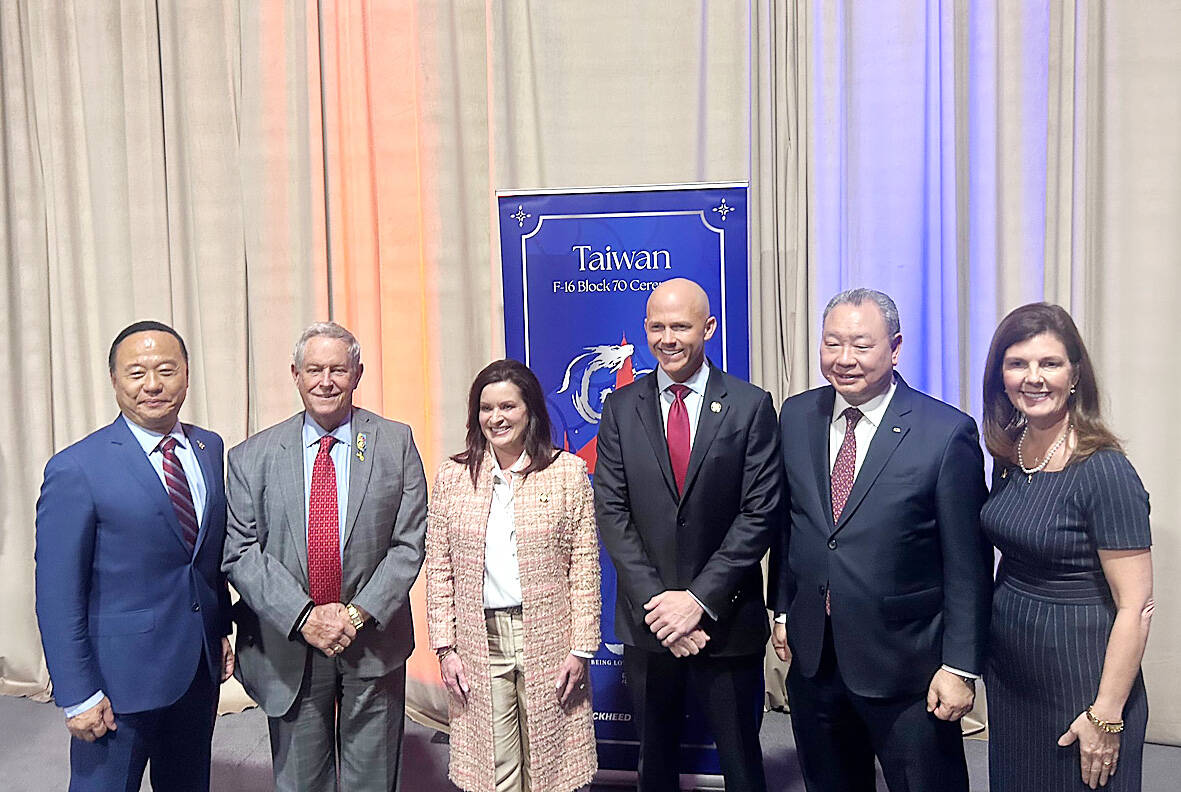Deputy Minister of National Defense Po Horng-huei (柏鴻輝) and Representative to the US Alexander Yui on Friday attended a delivery ceremony for the first of Taiwan’s long-awaited 66 F-16C/D Block 70 jets at a Lockheed Martin Corp factory in Greenville, South Carolina.
“We are so proud to be the global home of the F-16 and to support Taiwan’s air defense capabilities,” US Representative William Timmons wrote on X, alongside a photograph of Taiwanese and US officials at the event.
The F-16C/D Block 70 jets Taiwan ordered have the same capabilities as aircraft that had been upgraded to F-16Vs.

Photo: Screen grab from William Timmons’ Facebook page
The batch of Lockheed Martin fighter jets would be used by the 7th Tactical Fighter Wing, a new air force unit to defend Taiwan proper’s eastern region.
In January, President William Lai (賴清德) said during an inspection of the unit that two out of its three tactical groups had been staffed and were waiting for delivery of the jets.
The F-16C/D Block 70 is expected to be the final model of Lockheed Martin F-16s, as the US Air Force and US allies replace their legacy aircraft with F-35 stealth fighters.

Photo: Screen grab from William Timmons’ X account
The main features of F-16C/D Block jets are AN/APG-83 active electronically scanned arrays, AN/ALQ-254(V)1 all-digital electronic warfare suites, conformal fuel tanks, and new mission computers, cockpits and interface systems.
The fighters are capable of firing AIM-120 and AIM-9 air-to-air missiles and an assortment of ground attack munitions.
The F-16C/D’s ground-attack weapons include anti-radiation missiles, GPS-guided bombs, and one of Taiwan’s latest acquisitions, the long-range AGM-154 Joint Standoff Weapon glide bombs.
The Ministry of National Defense yesterday thanked US government agencies for making the delivery possible.
Washington’s invitation of senior Taiwanese officials to attend the delivery was a show of the US’ commitment to the Taiwan Relations Act and the “six assurances,” it said in a news release.
The “six assurances” are guidelines for conducting relations between the US and Taiwan that were adopted in 1982 during negotiations between the US and China over the Joint Communique on Arms Sales to Taiwan. Under the guidelines, the US would not set a date for ending arms sales to Taiwan, nor would it consult with China regarding arms sales to Taiwan.
The Ministry of National Defense is working with the US to ensure the jets would be manufactured and delivered on schedule, it said, an apparent reference to production delays that have plagued the aircraft procurement.
Defense expert Mei Fu-hsing (梅復興) wrote on Facebook that while the new jets would be equipped with the AN/ALQ-254(V)1 technology, the jet delivered on Friday would likely lack that electronic warfare suite, as it only recently was flown in a Bahrain Air Force F-16C/D Block 70 jet over Edwards Air Force Base in California.
That would mean Taiwan would need to equip the fighter with an ALQ-184(V) electronic warfare suite as a substitute, he said.

A Ministry of Foreign Affairs official yesterday said that a delegation that visited China for an APEC meeting did not receive any kind of treatment that downgraded Taiwan’s sovereignty. Department of International Organizations Director-General Jonathan Sun (孫儉元) said that he and a group of ministry officials visited Shenzhen, China, to attend the APEC Informal Senior Officials’ Meeting last month. The trip went “smoothly and safely” for all Taiwanese delegates, as the Chinese side arranged the trip in accordance with long-standing practices, Sun said at the ministry’s weekly briefing. The Taiwanese group did not encounter any political suppression, he said. Sun made the remarks when

The Taiwanese passport ranked 33rd in a global listing of passports by convenience this month, rising three places from last month’s ranking, but matching its position in January last year. The Henley Passport Index, an international ranking of passports by the number of designations its holder can travel to without a visa, showed that the Taiwan passport enables holders to travel to 139 countries and territories without a visa. Singapore’s passport was ranked the most powerful with visa-free access to 192 destinations out of 227, according to the index published on Tuesday by UK-based migration investment consultancy firm Henley and Partners. Japan’s and

BROAD AGREEMENT: The two are nearing a trade deal to reduce Taiwan’s tariff to 15% and a commitment for TSMC to build five more fabs, a ‘New York Times’ report said Taiwan and the US have reached a broad consensus on a trade deal, the Executive Yuan’s Office of Trade Negotiations said yesterday, after a report said that Washington is set to reduce Taiwan’s tariff rate to 15 percent. The New York Times on Monday reported that the two nations are nearing a trade deal to reduce Taiwan’s tariff rate to 15 percent and commit Taiwan Semiconductor Manufacturing Co (TSMC, 台積電) to building at least five more facilities in the US. “The agreement, which has been under negotiation for months, is being legally scrubbed and could be announced this month,” the paper said,

Japan and the Philippines yesterday signed a defense pact that would allow the tax-free provision of ammunition, fuel, food and other necessities when their forces stage joint training to boost deterrence against China’s growing aggression in the region and to bolster their preparation for natural disasters. Japan has faced increasing political, trade and security tensions with China, which was angered by Japanese Prime Minister Sanae Takaichi’s remark that a Chinese attack on Taiwan would be a survival-threatening situation for Japan, triggering a military response. Japan and the Philippines have also had separate territorial conflicts with Beijing in the East and South China